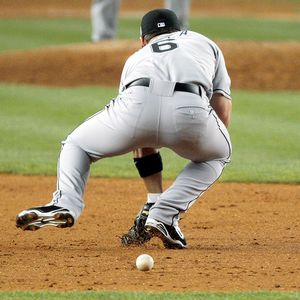 Mistakes or errors occur every day in baseball, but many players don’t have the mental game that allows them to let go of errors and this hurts their chances for success.
Mistakes or errors occur every day in baseball, but many players don’t have the mental game that allows them to let go of errors and this hurts their chances for success.
Errors such as missing a throw, botching a simple ground ball, striking out at the plate, or dropping a pop up occur all the time in baseball. Nobody is perfect, therefore errors are just another part of the game. However, these errors often become a huge mental barrier for athletes who cannot cope with mistakes, and as a result it affects their performance. In many cases, especially with youth players, these athletes will become frustrated and shut down for the remainder of the game.
I am sure you have made some mistakes in your baseball career, which you were unable to forget quickly. You might have carried a mistake with you for most the rest of the inning or even the rest of the game. Many ball players can’t enjoy the game or even the rest of their day because they are too busy beating themselves. It’s important to understand that dwelling on mistakes doesn’t help you get the error back, but it does take your head out of the game.
Dwelling on errors or missed chances during a game is the top distraction for athletes today. You cannot play in the present moment, or enjoy the game when your mind is stuck on a missed opportunity or error you made on the last play.
Rarely do athletes use their frustration or anger to help them perform better in baseball. On some occasions athletes can channel their frustration to make it work for them instead of against them to increase their level of intensity.
Why does your mind want to stay glued on the past and dwell on errors?
Many players dwell on mistakes because they high expectations for their performance. When you make errors it does not match what you expected of yourself (or what you think others expect of you). You set a standard for yourself (.500 at the plate) and expect that you should always perform up to that standard. Some players will display their anger or disappointment to others who are watching because they want to show others they are better than their mistakes. This only acts as a distraction for you and your teammates.
Once you start dwelling on an error, it is very hard to stop the cycle of negativity. Why? Based on my experience, you’ll try to avoid making errors again – not a great mindset for playing freely and focusing in the present play.
The best players in baseball are able to let go of mistakes and learn from them. Use mistakes to help you grow and become better ball players. If you can let go of mistakes quickly and maintain your focus so it does not snowball and affect the next play, you’ll be a better player overall. If you struggle with letting go of mistakes don’t expect your mental game to change overnight. You have to be patient with these changes, and improve over time.
The following are two important mental game strategies that will help you let go of errors:
1. First, you have to check your expectations prior to entering the dugout. Expectations are the root of your anger or frustration with errors because they set you up for feeling let down when you don’t play up to your personal standards. Some athletes have their own ways to deal with stress and frustration in competition. For example, some athletes practice relation techniques between plays, innings and on the sidelines. I have worked with some pitchers in the past who use items like Brain Stress Balls in the dugout between inning to help them let go of mistakes and ease tension in a positive manner.
2. After an error, you have to let go quickly and focus on the next play. This means you have to interrupt the dwelling cycle. You interrupt the dwelling cycle by making the mistake OK in your mind so you can play on. I know it’s not OK for you when you make errors, but you have to think this way to move on to the next play!


























A tough core gamer is person who is wholly immersed by
his online desire; he isolates themselves from relatives and buddies, enables daily actions tumble from the border.